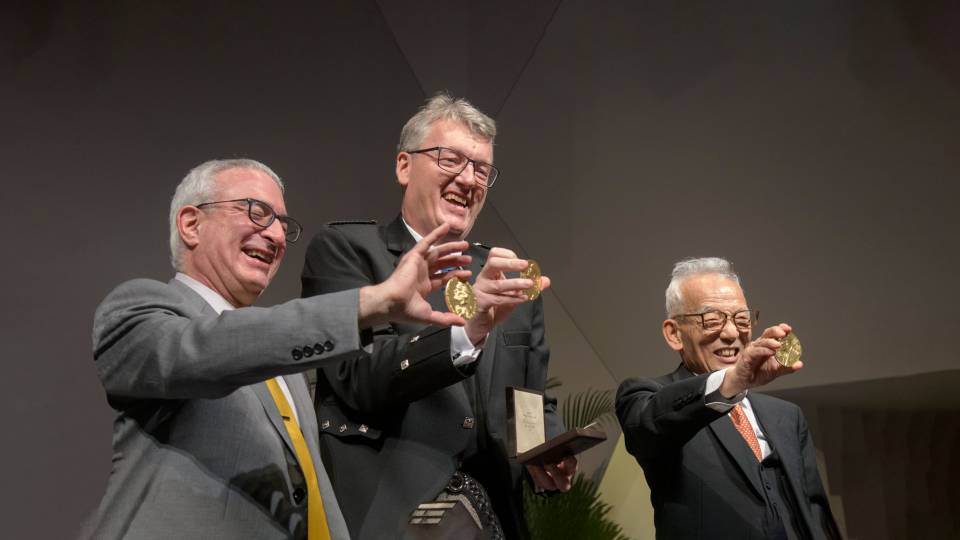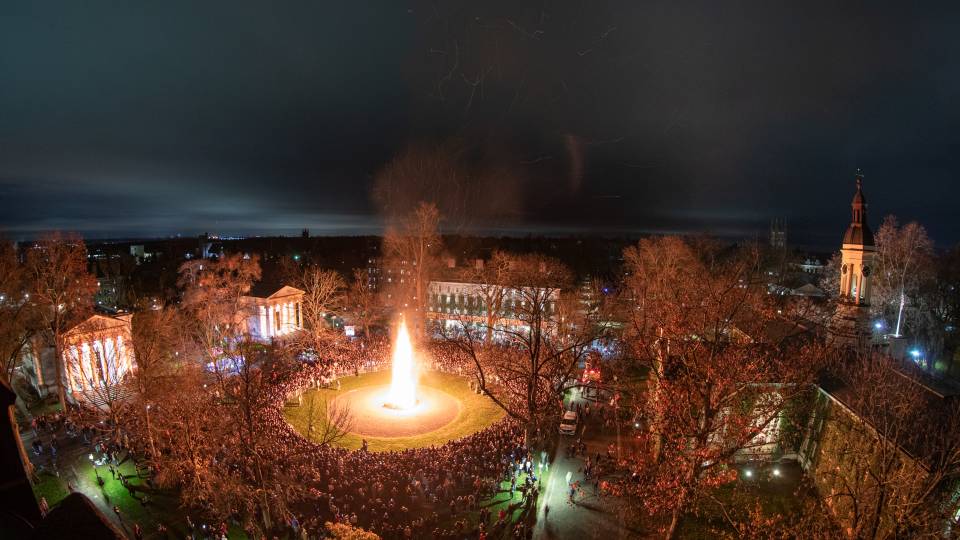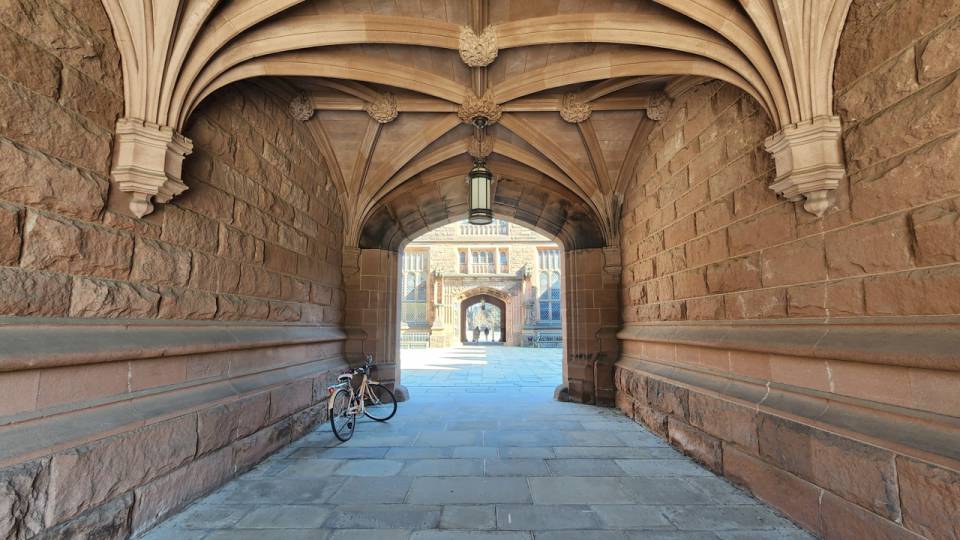In 2021, the Princeton community came back together under a new normal, with new ways to adapt and persevere, and to enjoy moments of connection and celebration.
The year began with the return of undergraduates to campus after many months away due to the COVID-19 pandemic. “At Princeton, students, faculty, and staff have risen to the challenge in a multitude of ways,” President Christopher L. Eisgruber wrote in his annual State of the University letter on Feb. 4. “We begin the new semester with reasons for optimism and hope.”
From the success of Tigers at the Olympics and at the Paralympics in Tokyo to the five faculty and alumni who won Nobel Prizes, you can relive some of these moments of optimism and hope here and in Princeton’s Year in Review video — set to the song “The Good Part” by AJR and dedicated to our front line workers who have made the impossible possible in 2021.
As Eisgruber noted in his message about plans for the fall semester, Princeton will remain committed to its teaching and research mission. "We must do everything possible to restore the full and vibrant Princeton community we so cherish," he said in May 2021, encouraging all to lean vigorously into seizing that opportunity.
While life often felt different in 2021, the University community persisted and will continue to venture forward together in 2022.
Coming back and keeping safe
The year began with a phased move-in Jan. 16-24. Undergraduates were invited but not required to return to campus for the spring 2021 semester as classes remained virtual.
Safety policies included masks, social distancing and more than 400,000 tests processed at the University’s new COVID-19 testing laboratory this year. To keep students informed of guidelines, the University launched a robust public health campaign called the Princeton Playbook, and the COVID-19 Resources website continues to be the source for public health policies and data.
By late winter, COVID-19 vaccines began to roll out across the country. The University partnered with state, county and local health authorities to offer vaccination clinics on campus, with booster shots becoming available in the fall.
Vaccine requirements enabled the return of fully in-person education for the fall 2021 semester, with faculty, staff and students returning to learn, live or work on campus. Returning students supported local businesses struggling during the pandemic through Tigers in Town.
Throughout it all, staff from University Health Services, Environmental Health and Safety, Housing, Campus Dining and countless other offices worked tirelessly to support students and the campus community during the pandemic.
Noteworthy Nobel prizes
This year will also be remembered for a historic week in October when two faculty members and three alumni were awarded Nobel Prizes in various categories.
Princeton’s Nobel Prize laureates for 2021:
- David MacMillan, the James S. McDonnell Distinguished University Professor of Chemistry, was awarded a Nobel Prize in Chemistry.
- Syukuro Manabe, a senior meteorologist in the Program in Atmospheric and Oceanic Sciences, was awarded a Nobel Prize in Physics.
- Maria Ressa, a Class of 1986 graduate and CEO and president of the Philippines-based news organization Rappler.com, was awarded a Nobel Peace Prize.
- Joshua Angrist, a 1989 Princeton Ph.D. who is now a professor at MIT, was awarded a Nobel Prize in Economic Sciences.
- David Card, a 1983 Princeton Ph.D. who is now a professor at Stanford, was also awarded a Nobel Prize in Economic Sciences.
In addition to press conferences and celebrations on campus for MacMillan and Manabe in October, the five Princeton laureates were feted by the Nobel Prize Committees in official award ceremonies in different locations around the world in early December.
The 2021 winners join the long list of other Princeton faculty and alumni who have been awarded Nobel Prizes.
Groundbreaking discoveries
In November, Princeton researchers announced a groundbreaking discovery that has the potential to switch off major cancer types without side effects. Longtime Princeton cancer biologist Yibin Kang Tweeted it was “the most important breakthrough in my lab since its inception 17 years ago.” Kang is the Warner-Lambert/Parke-Davis Professor of Molecular Biology and one of the principal investigators of the new Princeton Branch of the Ludwig Institute for Cancer Research.
Faculty also shared exciting research discoveries across academic fields, from an archaeological team that identified the world’s oldest industrial-scale brewery in Egypt to the astrophysicists who created a revolutionary new two-sided map of Earth.
Princeton’s Pulitzer-Prize winning poet Paul Muldoon discovered the in-depth stories behind 154 Paul McCartney songs in the two-volume book “The Lyrics: 1956 to the Present” with Sir Paul. The legendary McCartney made a surprise two-hour visit via Zoom to Muldoon’s “How to Write a Song” class in February.
A virtual Princeton Research Day spotlighted the talents of undergraduates, graduate students, postdoctoral researchers and other early-career researchers at Princeton.
And to end the year, Princeton literally broke ground on its new Lake Campus Development in West Windsor.
Commitments to diversity, equity and inclusion
In 2021, Princeton expanded its long-term commitment to diversity, equity and inclusion, and published its first annual DEI report focused on the University-wide effort to combat systemic racism.
The establishment of the Emma Bloomberg Center for Access and Opportunity brought together Princeton’s initiatives for access and inclusion. The center also serves as a hub for research and innovation in the field of college access and success, as Princeton has played a leading role in the national movement to increase socioeconomic diversity, access and inclusion in higher education. Among its many events, the Bloomberg Center organized Princeton’s participation in the national celebration of first-generation college students on Nov. 8.
The transformative power of a college education and how to better support first-generation, lower-income students was also the topic of the Pre-Read book for the first-year class of 2025. “Moving Up Without Losing Your Way: The Ethical Costs of Upward Mobility” was written by philosopher and Princeton Class of 2002 graduate Jennifer M. Morton.
In the fall, the Gender + Sexuality Resource Center (GSRC) launched to serve women and femme-identifying students and LGBTQIA+ students, and to offer gender and sexuality programming and co-curricular experiences for the University community. The center continues the legacies of the University’s Women*s Center and LGBT Center.
Several new programs and initiatives honoring and acknowledging local and international Indigenous communities were launched this year.
The Graduate School launched an inclusive leadership program supporting Princeton’s anti-racism efforts.
Looking to make impacts beyond campus, the Office of Finance and Treasury expanded its Supplier Diversity Action Plan to broaden the pool of suppliers who work with the University and to support more businesses led by people of color, women, veterans and members of the LGBTQ+ community. Princeton also partnered with the New Jersey Educational Facilities Authority to support diverse-owned financial firms and provide new investment options for colleges and universities in New Jersey.
Welcoming (back) Princetonians
The undergraduate Class of 2025 arrived on campus for the first time in August, and the Graduate School welcomed its most diverse class of incoming master’s and Ph.D. candidates.
Princeton welcomed back to campus Class of 1997 alumnus Gene Jarrett, as Dean of the Faculty, and Class of 2000 alumnus John Mack, as Ford Family Director of Athletics.
Longtime faculty member Amaney Jamal, the Edwards S. Sanford Professor of Politics and director of the Mamdouha S. Bobst Center for Peace and Justice, began as dean of the Princeton School of Public and International Affairs (SPIA) on Sept. 1.
In late fall, Gadi Dechter, an experienced communications and government affairs professional and currently the head of public affairs at APCO Worldwide’s headquarters, was named Princeton’s new vice president for communications and government affairs.
Celebrating successes
From Rhodes Scholars to Bonfires, Princetonians had much to celebrate in 2021.
The Class of 2021 marked their graduation with virtual Baccalaureate and Class Day ceremonies featuring addresses by Ruth J. Simmons and Trevor Noah. An in-person, socially-distanced Commencement ceremony was held in Princeton Stadium on May 16 for graduating seniors and master’s and Ph.D. students.
This year marked 50 years of women’s athletics at Princeton, and Tigers like women’s water polo goalkeeper Ashleigh Johnson, Class of 2017, helped the United States earn gold at the summer Olympics in Tokyo. Over the years, Princetonians have won a total of 62 medals at the summer Olympics. SPIA graduate student and U.S. Navy veteran Brad Snyder also made history in Tokyo by winning gold in the triathlon at the Paralympics.
On a cool November night, varsity athletic accomplishments were celebrated during a traditional bonfire on Cannon Green. The ceremony recognized the women’s lightweight rowing team’s national championship in spring 2021, the Princeton football team’s share of the Ivy League championship and victories over Harvard and Yale, and other fall teams’ successes.
Among numerous awards and recognitions for Princeton’s leading faculty, Keeanga-Yamahtta Taylor, professor of African American studies, was awarded a 2021 MacArthur Fellowship. Andrea Goldsmith, dean of the School of Engineering and Applied Science, and Stephen Pacala, the Frederick D. Petrie Professor in Ecology and Evolutionary Biology and associated faculty in Princeton’s High Meadows Environmental Institute (HMEI), were named to President Joe Biden’s Council of Advisors on Science and Technology.
Avi Wigderson, a 1983 Ph.D. graduate on the faculty of the Institute for Advanced Study, was awarded the Abel Prize, the equivalent in mathematics to a Nobel Prize.
Princeton students and recent alumni were recognized for their academic pursuits and service to humanity, with three Rhodes Scholars, five Schwarzman Scholars, and one Marshall and one Mitchell scholar. And while Alumni Day was not held in person due to the pandemic, the top undergraduate recognition, the Pyne Prize, and the top graduate student award, the Jacobus Fellowship, were awarded.
Venturing forward
Finally, 2021 marked Princeton’s 275th anniversary on Oct. 22. The milestone followed the official launch of the Venture Forward campaign.
The campaign supports the University’s strategic plan, and the fundraising and engagement initiatives are aligned with the key focus areas of that plan: college access and affordability, financial aid, data science, bioengineering, the environment, American Studies, and other important areas of inquiry that characterize Princeton’s commitment to the liberal arts.
In November, a major gift to the Venture Forward campaign from Blair Effron, Class of 1984, and Cheryl Effron was announced to expand the former Program in American Studies into the new Effron Center for the Study of America.
The Venture Forward campaign will continue into the new year and beyond, moving Princeton from the present to the possible.






